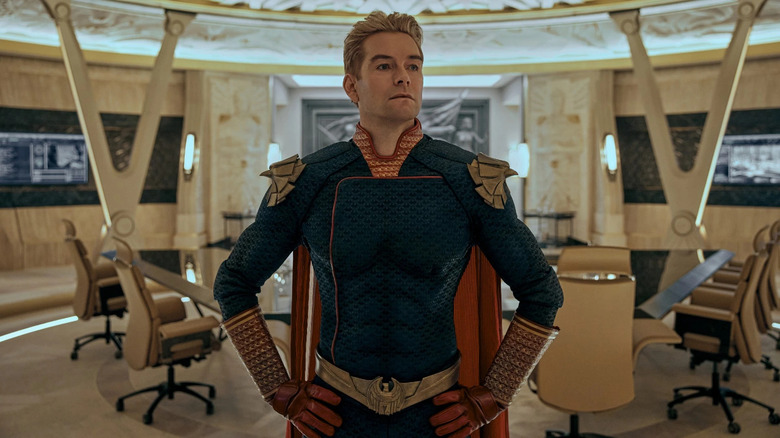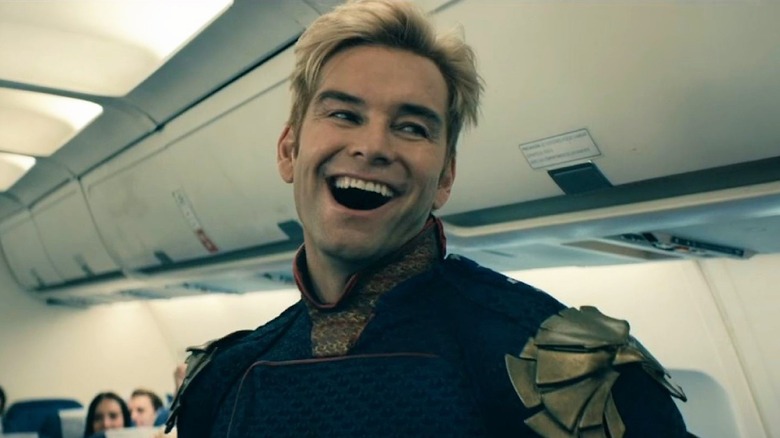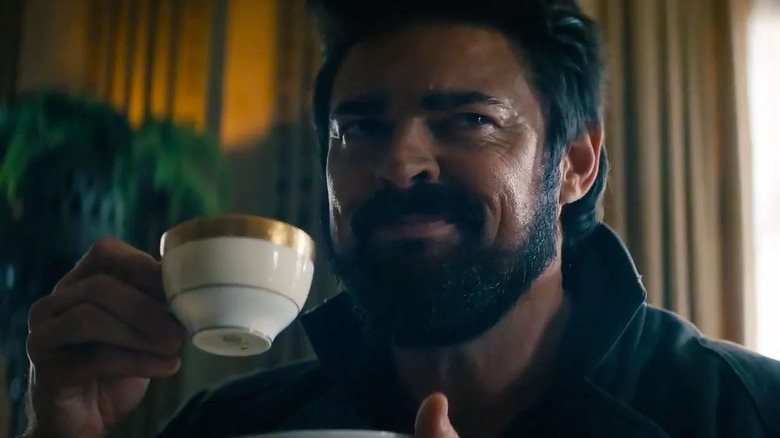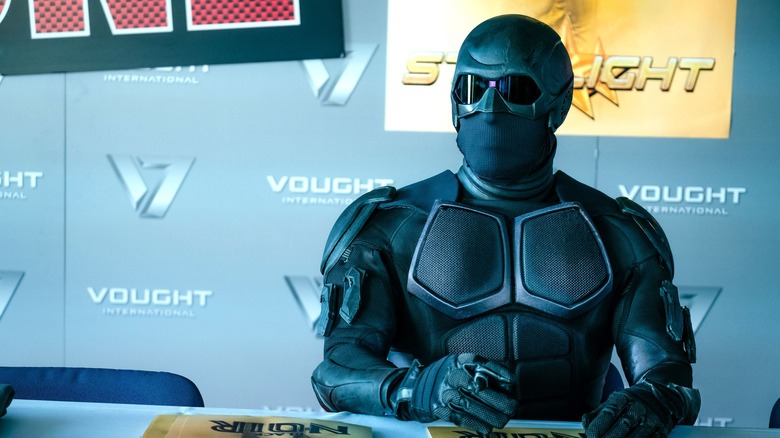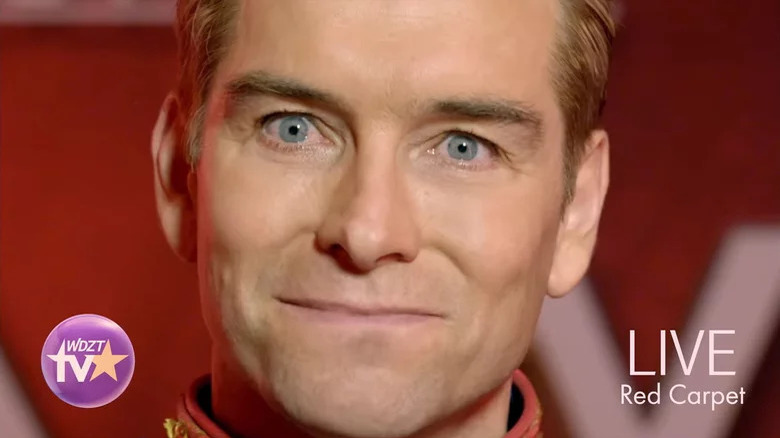How Long Can The Boys Keep Homelander Around?
This post contains spoilers for "The Boys" season 3, as well as "The Boys" comic series, "Breaking Bad" and "Game of Thrones."
The most impressive part of "The Boys" is the way it's developed the character of Homelander (Antony Starr), the all-powerful, indestructible superhero who captains (or co-captains) the Seven. The concept of an evil Superman may not be super fresh territory, but rarely have we seen the character type handled with such consistent competence. For three seasons now, the protagonists of "The Boys" have been fighting against an evil villain who could technically rip them all to shreds at any moment if he desired.
But as of halfway through season 3, the boys are all still alive. And even though Starlight (Erin Moriarty) and Queen Maeve (Dominique McElligott) have openly defied Homelander, they both still live to tell the tale. Considering the sheer scale of the power imbalance on display here, this all feels like a miracle. "The Boys" has somehow managed to milk the tension around Homelander for this long without yet running out of steam. But realistically, how many more episodes until they run out?
The show's most recent episode features Homelander kicking Edgar (Giancarlo Esposito) out of power and replacing the man with Ashley (Colby Minifie), a character Homelander's successfully intimidated into doing everything he tells her to do, no matter what. Season 3 has also seen Homelander embrace his angrier, unapologetic side in public, only to find out that a significant percentage of America actually likes this side of him. With him calling Starlight's bluff of releasing the video that would destroy his reputation, as well as his casual murder of Supersonic, it's clear that we're approaching a crossroads.
The risk of dragging things out
When asked how many seasons of "The Boys" he plans to write, showrunner Eric Kripke said, "The rough idea in my head is five seasons total." Take that with a grain of salt though, because he also noted that his original plan for his previous show "Supernatural" was five seasons as well, and the show went on for fifteen years. The idea that he has a general five-season plan at the moment is promising though, because it indicates they've really thought through how to maintain narrative tension throughout the whole show, with some sort of conclusive finale in mind.
But does that plan include keeping Homelander as the Big Bad for five seasons straight? The longer he's around, the more it stretches credulity that he hasn't hunted down and killed the Boys, Queen Maeve, or Starlight. They've been foreshadowing Homelander snapping and going on a mass homicidal rampage for a while now, and if that doesn't happen soon it's going to feel like the show is dragging things out. You can only have him be so close to snapping for so long before viewers get frustrated.
On the other hand, because he's both so powerful and so unhinged, the character finally snapping could very well break the show. So much of "The Boys" is focused on satirizing our current world with all its corporate overreach and media manipulation; how could the show continue for much longer if Homelander decides to burn all that down? And if he's killed before he can burn the world down, how does the show deal with no longer having a proper Big Bad character?
Imagining a post-Homelander show
Considering how vital Homelander has been to the show's narrative so far, it almost seems impossible that "The Boys" could continue without him. At least, not any longer than an episode or two at most, let alone entire seasons. And yet, so much of season 3 so far seems dedicated to setting up compelling storylines that could sustain the show even after his death. You've got Victoria Neuman's storyline, the long-term question mark that is Homelander's powerful son Ryan, as well as the introduction of the temporary compound V that could give the normal characters superhuman powers. The complications that'll come with someone like Butcher (Karl Urban) becoming a supe is something that could give us more than enough material to last a few more seasons, with or without Homelander.
It's possible "The Boys" might take a cue from "Breaking Bad," a show that killed off its Big Bad character at the end of its fourth season. Rather than run out of steam as some fans feared, "Breaking Bad" followed up with sixteen of the most intense and exciting episodes of the show's run. The key was that they didn't try to replace Gus with an even more powerful and dangerous drug lord. Instead of having the audience worry about outside threats to Walt and Walt's family, they mostly dedicated their final season to Walt's family imploding from the inside. Likewise, the endgame of "The Boys" without Homelander may be more interesting if it was focused on the divisions between Butcher, M.M., Frenchie, Hughie, and Kimiko, not some new threat from an even more powerful supe.
How the comics handled things
There are already a ton of differences between the show and the source material, to the point where it's clear that how the comics' end is not going to happen in the TV show. That said, it does provide some clues as to what direction the show might take.
In the comics, Homelander is killed relatively close to the end of the series' run when it's revealed that Black Noir is a clone of Homelander, created by Vought as a failsafe in case Homelander went off the rails. Black Noir kills Homelander and then Butcher kills Black Noir. The rest of the series' run centers around Butcher being incapable of letting go of his hatred of superheroes. The guy he's been after this whole time is dead, but he still can't stop. The series ends with Butcher having to be put down by Hughie of all people.
Although the show's obviously not going to go in this exact direction — for one thing, we now know for a fact that the show's Black Noir is not a Homelander clone — it's easy to picture the show expanding on the comics' final storyline. It's already been foreshadowed that Butcher's thirst for vengeance (as well as his newfound powers) is going to lead him down an increasingly dark place, just as it's been established that M.M. has lost his trust in and respect for Mallory. There are a lot of organic ways for this group to fracture in the absence of a clear goal, and a lot of exciting TV to make out of it.
Killing Homelander might not kill the show, but save it
Perhaps one of the wisest decisions made by the "Game of Thrones" showrunners (or more accurately, George R. R. Martin) was to kill off Joffrey early in the fourth season. The sadistic, bratty child-king was a brilliantly realized villain, but I don't think readers or viewers could've stomached the character for much longer. The show later smartly decided to kill off Ramsay Bolton (Joffrey's replacement as the show's most punchable character) in season 6. After all, how much longer could we have watched those characters gleefully torture those around them before it became too much? Likewise, how long can we watch Homelander gleefully torment everyone with no real repercussions before it starts to feel like we're watching misery porn?
Perhaps more importantly, killing him off would give "The Boys" a chance to broaden our understanding of what the show's about. Is this a story just about trying to take down Evil Superman, or does its premise still hold up without him? Can the show's big cast of varied, compelling characters stay fresh and exciting in a post-Homelander show? I'd argue it can.
In the end, of course, "The Boys" doesn't have to do anything. There are probably ways to organically delay Homelander's downfall; maybe he flirts around with a redemption arc, or there's some bigger threat introduced that turns him into a reluctant temporary ally for the boys. When it comes to the question of what to do with this character, there are clear advantages and disadvantages to every option. But whichever direction they choose to go, we can probably trust that the writers will handle it as well as they can. They haven't let fans down yet, after all.
